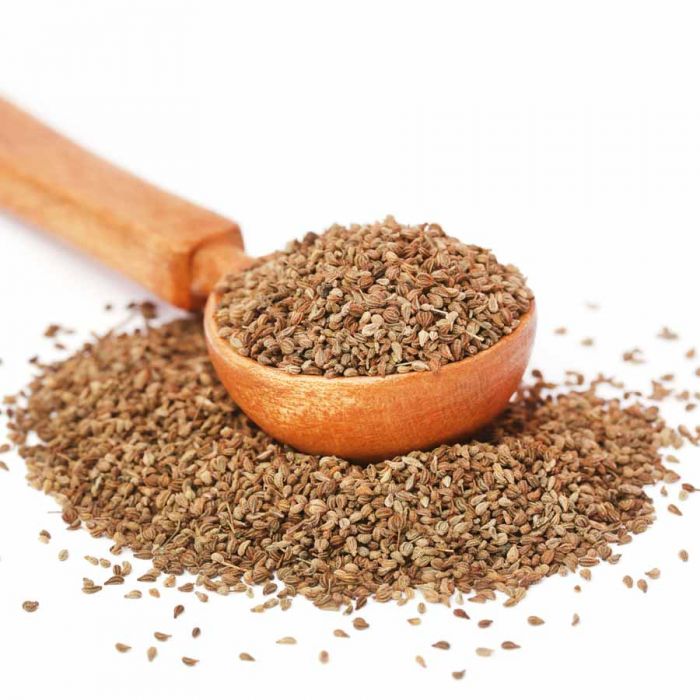What are the benefits & side effects of Carom seed(Ajwain)?
What is Ajwain?
Ajwain is a plant-based product that has its roots in India. These seeds range in colour from a mild shade of olive green to brown. It is also known as Ugragandha in Sanskrit due to its potent scent. Ajwain seeds have a flavour that is bitter and pungent, similar to oregano. It is frequently added to the production of curries and pickles because of its potent aromatic fragrance.

The seeds of the ajwain plant, Trachyspermum Ammi, are known as carom seeds. They frequently appear in Indian food. The fruit of the ajwain plant is referred to as carom seeds. You can purchase them whole or have them ground into a powder to use as a spice in recipes.
Ajwain is beneficial to your health in addition to adding taste to food. The seeds contain a trace quantity of Ajwain oil, which is rich in thymol, a phenol that gives the fruit its thyme-like aroma. Thymol is often used as a treatment for digestive problems. Additionally, it possesses antibacterial and antifungal qualities.
Uses of ajwain seeds in cooking:
- Because of their complex flavour and distinctive flavour, carom seeds are an interesting spice to add to curries.
- The best way to use carom seeds is to dry roast them or rapidly fry them in butter before adding them to a recipe.
- Ajwain, also known as carom seeds, are introduced at the “tadka,” or “seasoning,” stage of Indian cookery. In order to infuse the oil with the flavours of the spices, tadka involves frying entire seeds in heated oil.
- Crush the ajwain between your palms or in a mortar and pestle, then add it at the very end of cooking if you want to preserve the spice’s pungent flavour.
Properties of Ajwain:
- it’s an anthelminthic (acts against parasitic worms)It could possess analgesic (pain-relieving) properties.
- might have antibacterial properties that either kill or inhibit germs.
- may have antifungal (killing or preventing the growth of fungi) properties.
- could have antiviral properties (acts against viruses)
- might act as a cough suppressant and/or have antiplatelet properties.
- may have cholesterol-lowering (antihyperlipidemic) properties.
- may contain a diuretic (increases the flow of urine)
- could have anti-inflammatory properties (relieves inflammation)
- may function as a detoxifier (removal of toxic substances from the body)
- There’s a chance it has hepatoprotective (liver-protecting) qualities.
- might be a protective agent.
- may act as an inducer of digestion.
- might relieve ulcer pain (antiulcer)
Benefits of Ajwain
Ajwain seeds are fantastic for your health because they are high in carbs, fibre, protein, and lipids. Additionally, it contains niacin, thiamine, salt, phosphorus, potassium, calcium, and other vitamins and minerals.
These seeds have been used in Ayurvedic medicine to cure gas, ease constipation, and enhance digestion. The following are the advantages benefits of ajwain.
1. Helps in Digestion:
- Ajwain seeds aid in better digestion by speeding up the process of food breakdown in the gut. When the active enzymes in ajwain seeds are broken down, the stomach juices are released. This improves how well the digestive system functions.
- The digestive juices in carom seeds relieve constipation to some extent and prevent stomach cramps and bloating.
2. Weight loss:
- Ajwain seeds, which are laxative, hasten the digestive process and force you to use the restroom, which aids in weight loss.
- It can draw out the healthy nutrients and prevent the body from storing an excessive amount of fat. Additionally, it quickens the body’s metabolism, which aids in weight loss.
3. Pain Reliever:
- Carom seeds are a potent pain reliever thanks to the thymol chemicals they contain. They can provide relief from toothaches, earaches, and headaches. Ajwain seeds can relieve headaches and migraines when they are crushed and applied to the temples.
- Earaches can be relieved by dabbing a few drops of carom seed oil on the outer part of the ear. Toothaches can be relieved by gargling with lukewarm water and soaked carom seeds three to four times per day.
4. Prevents early hair ageing:
- Applying carom seed paste to your hair or drinking a glass of water infused with ajwain seeds, curry leaves, and dried grapes once a day will help maintain a healthy scalp and delay the onset of early hair ageing.
5. Helps to treat respiratory tract infection:
- Reduces swelling and kills germs to treat respiratory tract infections: Chemicals in carom seeds are effective at treating sore throats and other respiratory infections.
- When you chew ajwain seeds with lukewarm water, mucus is forced out of the nose.
6. Prevents acne and pimples:
- Acne and pimple prevention: Ajwain seeds naturally contain antioxidants and anti-inflammatory compounds that can help lessen skin irritations like acne and pimples.
- The application of a carom seed paste to your skin for 10 to 15 minutes helps remove grime and lighten acne scars.
Side effects of Ajwain
- Beware if you enjoy eating ajwain! Consuming carom seeds in excess can frequently cause gas and acid reflux.
- Ajwain contains thymol, which can cause nausea, vomiting, and lightheadedness (only if you are allergic)
- The ajwain seeds have powerful bioactive chemicals, which can lead to tongue irritation, a burning sensation, and mouth ulcers, according to an article in Pharmeasy.
- Ajwain must be avoided if you are pregnant. Carom seeds may impair foetal growth.
- Not only that, but excessive eating of raw ajwain is regarded as hazardous because it can cause deadly poisoning.
- It must not be done if you are having surgery. According to the Pharmeasy article, taking ajwain supplements may make bleeding more likely both during and after surgery.
REFREENCES:
- https://www.india.com/lifestyle/6-dangerous-side-effects-of-ajwain-carom-seeds-you-must-read-5358881/
- https://pharmeasy.in/blog/ayurveda-uses-benefits-side-effects-of-ajwain/
- https://www.healthifyme.com/blog/ajwain/
- https://www.tashasartisanfoods.com/blog/ajwain-carom-seeds-what-wonders-do-you-hold/
- https://www.potsandpans.in/blogs/articles/ajwain-seeds-health-benefits-uses-and-important-facts
For more details, kindly visit below.